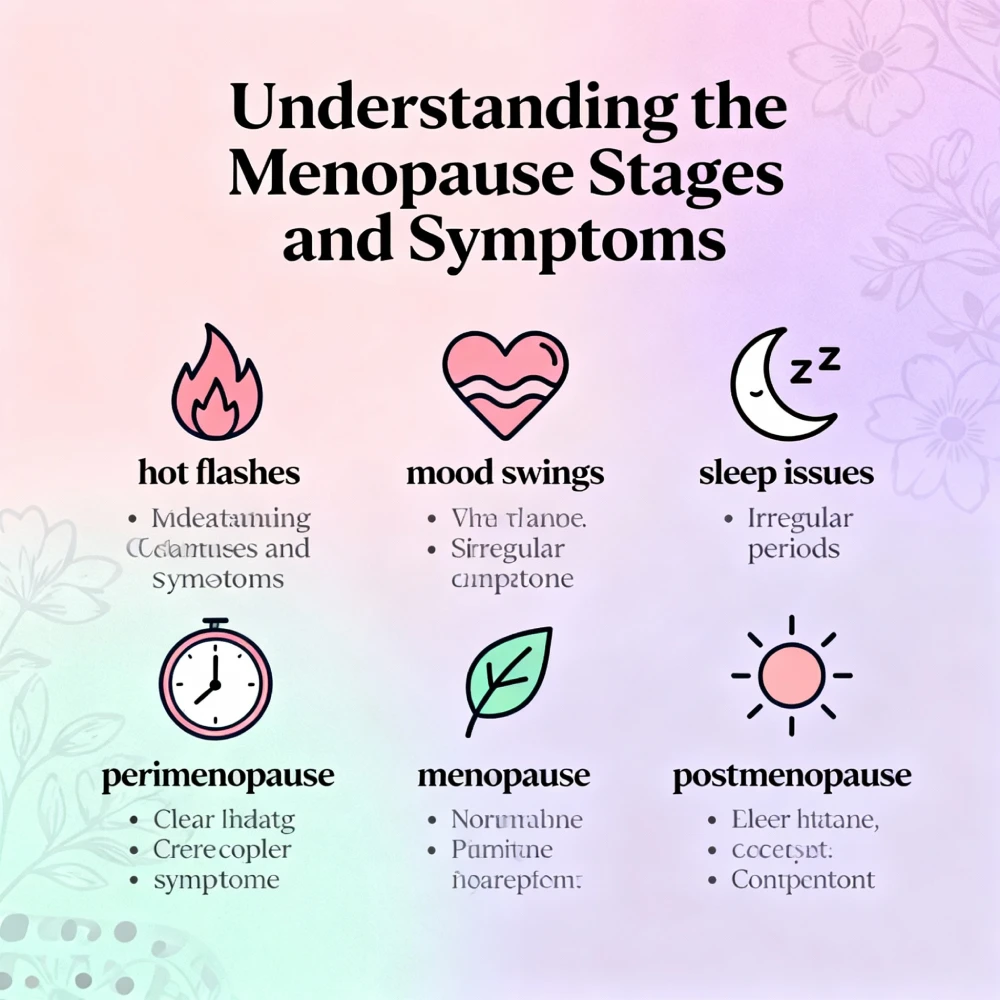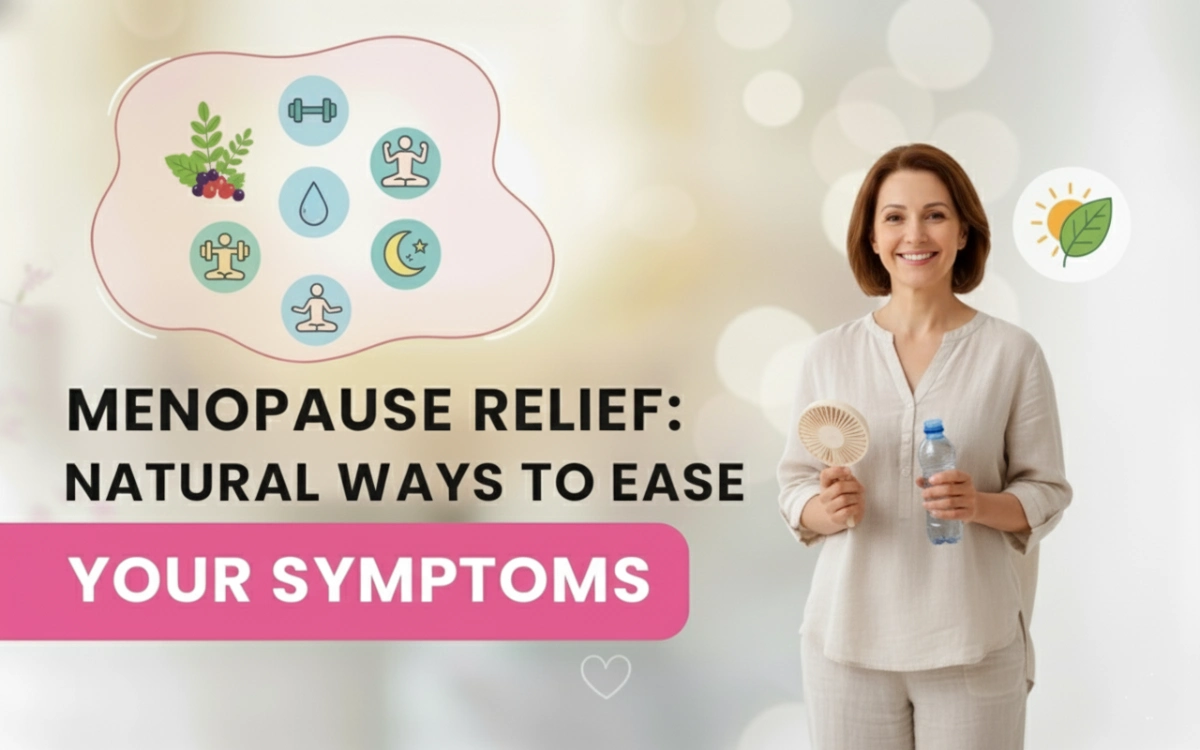Menopause is a natural life stage, yet the transition can feel anything but simple. Hot flashes arrive without warning, sleep becomes unpredictable, moods swing, and daily routines start to feel harder than they used to. If this sounds familiar, you are not alone. Every woman experiences menopause differently, which is why a personalised approach to menopause treatment works best. Relief is possible when symptoms are understood, triggers are identified, and a practical plan is put in place.
This plan can include natural remedies for menopause, lifestyle adjustments, and medical options such as hormone therapy when needed. With clear guidance and steady menopause support, women can move through this transition with comfort and confidence.
Why this topic matters in Dubai
Life in Dubai brings unique considerations during menopause. The warm climate can intensify hot flashes and night sweats, hydration needs are higher than in cooler countries, and the pace of professional life leaves little room for poor sleep. Many families also live far from extended relatives, which means less informal help during challenging weeks. On the positive side, Dubai offers high-quality care, ready access to modern diagnostics, and clinics that understand multicultural needs.
When women combine evidence-based advice with practical daily strategies suited to the local environment, menopause symptoms become more predictable. Simple steps such as keeping a water bottle close, planning light evening meals, and choosing breathable fabrics for work and exercise make a noticeable difference in day-to-day comfort.
Understanding the stages and symptoms

Menopause does not happen overnight. Perimenopause is the lead-up phase when periods become irregular and symptoms begin. This stage can last several years and is often when hot flashes, night sweats, mood changes, and sleep disturbance are most noticeable. Menopause is defined as twelve months without a period. The years after this milestone are called postmenopause. Symptoms can settle during postmenopause, although vaginal dryness, discomfort with intimacy, and changes in bone density and heart health deserve ongoing attention.
Common complaints include sudden waves of heat that spread across the chest and face, waking drenched during the night, irritability, low mood, forgetfulness, brain fog, joint stiffness, weight gain around the abdomen, and a drop in libido. Some women also notice palpitations, headaches, or a sense that their usual coping capacity has narrowed. None of these experiences are a sign of weakness. They are the body’s response to shifting hormone levels, especially the gradual decline of oestrogen.
How diagnosis and evaluation work
A careful history is usually the most important part of diagnosis. Your doctor will ask about cycle patterns, sleep, mood, hot flashes, vaginal symptoms, bladder discomfort, weight changes, and family history of conditions such as osteoporosis or breast cancer. In many women over forty-five, symptoms and menstrual changes are enough for a clinical diagnosis and no tests are needed. Blood work may be considered if symptoms begin very early, if another condition could be contributing, or if thyroid or iron imbalance is suspected. A review of bone health, blood pressure, weight, and cholesterol sets a helpful baseline.
If vaginal dryness or discomfort with intimacy is present, an examination can guide local treatment. The point of evaluation is not to label you. It is to choose the safest and most effective plan for menopause treatment based on your history and goals.
Menopause treatment built around you
There is no single blueprint that suits every woman. The most reliable plans are layered. The first layer is lifestyle, because daily habits often reduce symptom intensity within a few weeks. The second layer is natural remedies for menopause chosen with care, since quality and dosing matter. The third layer is targeted medical therapy when symptoms are severe or the quality of life is limited. Moving between these layers is normal. A woman who does well with lifestyle measures alone this year may need additional support next year. A woman who starts hormone therapy for a period of intense symptoms may later step down to nonhormonal strategies as life settles. Flexibility keeps treatment aligned with real needs.
Natural remedies for menopause that help
Gentle but consistent strategies bring meaningful relief for many women. Temperature control is a powerful ally. Wearing breathable fabrics, dressing in light layers, using a cooling pillow, and keeping a fan near the bed create a more comfortable baseline and reduce the intensity of night sweats. Hydration smooths the day as well. Sipping water regularly rather than gulping large amounts at once helps regulate body temperature and reduces headaches and fatigue. Caffeine and spicy food can trigger hot flashes for some women, especially in the evening, so experimenting with timing and portion size often pays off.
Movement supports both body and mind. Regular walking or cycling improves sleep quality, calms anxiety, and steadies weight. Strength training twice a week protects bone and muscle, which becomes increasingly important after menopause. Gentle yoga or stretching reduces joint stiffness and supports balance, which helps prevent falls later in life. Nutrition deserves attention, too. A plate filled with vegetables, fruit, whole grains, lean protein, and healthy fats provides the fibre and micronutrients that the body needs for hormone metabolism and mood stability. Calcium-rich choices such as dairy, tofu, and leafy greens support bone, while vitamin D status should be checked and corrected if low.
Some women explore botanical options. Black cohosh, red clover, and sage are frequently discussed. These may help mild hot flashes, although results vary and products are not equal in quality. If you wish to try a herbal remedy, discuss it with your doctor first, especially if you take prescription medicines, have liver concerns, or are being treated for cancer. Magnesium glycinate at night can support relaxation and sleep for some women. Omega-3 fats from fish or algae oils support heart health and may help mood. These are not magic cures, but as part of a thoughtful plan, they can make life more comfortable.
Hormone therapy explained clearly
Hormone therapy replaces a portion of the oestrogen your body is no longer producing. It is the most effective treatment for hot flashes and night sweats and often improves sleep, mood, joint pain, and vaginal symptoms. If you still have a uterus, progesterone is added to protect the lining. If you have had a hysterectomy, oestrogen alone may be used. Hormone therapy comes in many forms, including patches, gels, sprays, and tablets. Transdermal options such as patches and gels are popular because they provide steady levels and have a favourable risk profile for many women.
Safety is always part of the conversation. For healthy women who start within ten years of their final period or before the age of sixty, benefits often outweigh risks when the dose is tailored and monitoring is in place. Women with a personal history of breast cancer, unexplained vaginal bleeding, liver disease, or certain clotting disorders may need alternative approaches. A personalised consultation considers your medical and family history, your preferences, and your symptom pattern. When hormone therapy is not suitable, nonhormonal medicines such as specific antidepressants in low doses, gabapentin at night, or newer medications that target the nervous system pathways of hot flashes can be considered. Vaginal oestrogen used locally is safe for many women and provides powerful relief for dryness and recurrent urinary discomfort with minimal absorption into the bloodstream. This small detail often transforms the quality of life and intimacy.
Sleep, mood, and mental clarity
Poor sleep is one of the most disruptive features of menopause. Night sweats wake you, and then worry keeps you awake. Building a simple evening routine helps the brain prepare for rest. A consistent bedtime, a dark and cool room, a light dinner several hours before sleep, and a short wind-down period with reading or quiet music set the stage for better nights. If you wake hot, a quick change of sleepwear and a sip of cool water can allow you to return to sleep instead of lying awake, frustrated. When hot flashes are frequent, addressing them directly with lifestyle, natural remedies, or medical therapy will be the fastest route to reliable sleep.
Mood and cognition matter just as much. Fluctuating hormones can amplify stress and make concentration harder. Naming this pattern reduces fear. It is not a character flaw. It is biology. Gentle exercise, daylight exposure in the morning, structured breaks during intense work, and regular connection with friends create emotional stability. If low mood or anxiety persists, counselling or short-term medication can be lifesaving. Your doctor will not dismiss these concerns as minor. Mental health is part of menopause support.
Sexual health and pelvic comfort
Vaginal dryness, discomfort during intimacy, and recurrent urinary irritation are common after oestrogen levels fall. Local therapy is often the simplest solution. Regular use of a vaginal moisturiser maintains the natural acidity and elasticity of the tissues. During intimacy, a good quality lubricant reduces friction and protects delicate skin. Low-dose vaginal oestrogen, available as a tablet, cream, or ring, rebuilds the lining gently and restores comfort within a few weeks. Pelvic floor physiotherapy can help if there is pain, heaviness, or urinary leakage. Honest conversations with a partner about timing, pace, and comfort go a long way toward restoring confidence and connection.
Bones, heart, and long-term health
Menopause is a window to reassess future health. Bone density decreases more rapidly in the first years after the final period. A lifestyle that includes calcium-rich foods, vitamin D sufficiency, and strength training protects bones. Your doctor will advise when to schedule a bone density scan based on age and risk factors. Heart health also deserves attention. Blood pressure, cholesterol, weight, and blood sugar should be checked regularly. A diet built on plants, fish, olive oil, nuts, and legumes supports the heart, and limiting alcohol to modest amounts protects sleep and mood as well as cardiovascular risk. These are not abstract goals. They determine how strong and energetic you feel in the decade ahead.
When to seek expert care
It is time to see a specialist if hot flashes or night sweats are daily and disruptive, if sleep is consistently broken despite lifestyle changes, if your mood is persistently low or anxious, if intimacy is painful, if periods are unusually heavy or irregular with clots, or if you develop bleeding after a year without periods.
Any sudden change, such as chest pain, persistent headaches, or new neurological symptoms, should be assessed promptly. A consultation allows tailored advice, safe prescription choices, and a clear follow-up plan. In Dubai, arranging care is straightforward, and a focused appointment can transform months of coping into a confident strategy.
Frequently asked questions in a patient-friendly voice
Many women ask whether menopause treatment must always include hormones. The answer is no. Hormone therapy is the most effective treatment for vasomotor symptoms, but plenty of women achieve menopause symptom relief with natural remedies, lifestyle changes, and nonhormonal medicines. The choice depends on health history and personal preference. Another common question is how long hormone therapy should continue. There is no fixed rule. Some women need support for a few years, while others benefit longer. Regular reviews guide safe duration and dose.
Women often wonder whether natural remedies for menopause are safe. Many are, when chosen thoughtfully and used under guidance, but supplements vary in quality. Discuss your choices with a doctor, especially if you take other medications. Concerns about weight gain are frequent as well. Age-related changes in metabolism make weight management harder after menopause. A focus on protein at each meal, plenty of vegetables, mindful portions of whole grains, and regular strength work help body composition more than strict dieting. Finally, women ask if there is real menopause support available or if they are expected to endure symptoms alone. The reality is that structured support exists, and compassionate care makes a measurable difference. You do not need to struggle in silence.
A note from Dr. Neha Lalla
Menopause does not mark the end of vitality. It is a transition that deserves respect and practical care. My approach is to listen first, understand which symptoms matter most to you, and build a plan that blends lifestyle, natural options, and medical treatment when appropriate. Safety is always part of the conversation, and every decision remains yours. With clear information and steady follow-up, most women feel better within weeks and regain the energy and clarity they thought they had lost.
Conclusion and next steps
Relief during menopause comes from a plan that is personal and flexible. Natural remedies for menopause provide a gentle foundation. Thoughtful lifestyle choices stabilise sleep, mood, and energy. Hormone therapy and nonhormonal medicines are available when symptoms demand stronger support. Regular reviews protect bone and heart health for the long term.
If you live in Dubai and want a tailored strategy for menopause symptom relief, book a consultation with Dr. Neha Lalla. Together, you can map out a practical routine, decide whether hormone therapy suits your goals, and put trusted menopause support in place so you can move through this season with comfort and confidence.


